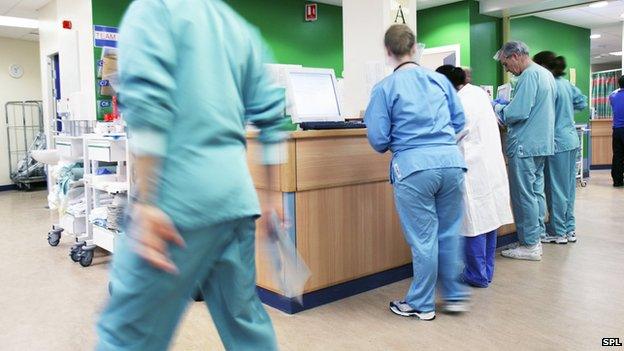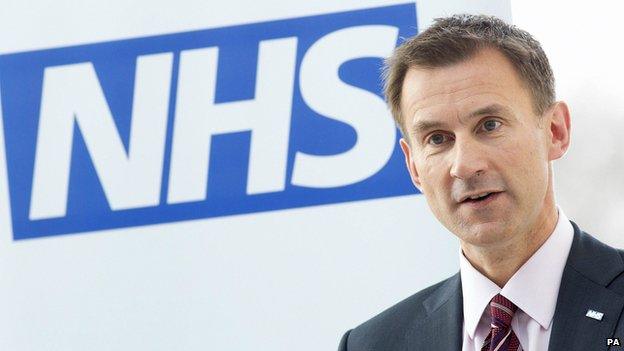Seven-day NHS - claims and counter claims
- Published
- comments

Feelings are running high in the debate about seven-day services in the NHS and that's an understatement.
Social media is buzzing with comment on the Government's seven-day plans for England, including ending the right of consultants to opt out of weekend working in non-emergency care (there is no such option for doctors in A&E).
My last blog on the issue generated a widespread reaction from the medical profession, some of it heated.
Some interesting arguments have been made, most of which are worth examining... so here goes.
Attention has focused on the mortality data used by the Department of Health.
Death rate?
This suggests that there is a 16% greater chance of death within 30 days for patients admitted to hospital on a Sunday than on a Wednesday and 11% on a Saturday.
The reasons for this have been contested. There is no clear evidence linking the additional mortality associated with weekend admissions to any particular factors.
People who arrive in hospitals at weekends tend to be sicker than those who do so during the week (people may feel they need to be quite ill before they go to A&E on a Saturday or Sunday).
In its review of the research the NHS Choices website said: "This study has not examined the reasons why there may be increased risk of death with weekend admission, so no assumptions should be drawn about staffing levels or the availability of senior staff."
The 16% figure represents "relative" risk (Sunday relative to Wednesday). But in absolute terms this represents only about two extra deaths for every 1,000 people arriving at a weekend on top of the 13 per 1,000 admitted in the middle of the week.
The data was gathered in the 2009/10 financial year and was based on 14.5 million patients in England.
New analysis based on more recent data is being carried out by NHS England and is due to be published within the next few months. It may well shed light on the argument.
It may be hard to draw conclusions from the existing data, but NHS chiefs are convinced that there is a weekend issue which needs to be tackled.
After allowing for people being sicker at weekends, they believe there is still a difference in the mortality data which cannot be explained and staffing is part of the answer.
#weneedtotalkaboutjeremy

A petition calls for a parliamentary vote of no confidence in the health secretary
Health Secretary Jeremy Hunt wants to abolish the right of consultants to opt out of weekend working, following the recommendation of a pay review body, and to increase the number of senior doctors in hospitals on a Saturday and Sunday.
Some in the medical world, taking this as an insinuation that they were not working hard enough, were infuriated.
A campaign group #weneedtalkaboutjeremy, external has taken up the cudgels, arguing that while the principle of better seven-day working is reasonable, the way it is being imposed is not.
Answers to Freedom of Information requests suggest that only a tiny proportion of consultants in England (less than 0.1%) have exercised their opt-out from weekend working.
So, they argue, the opt-out is a red herring. This FOI exercise, though, is not complete - with fewer than half of hospital trusts responding so far.
One of the most controversial areas of the debate, and where there is no published data to fall back on, is the number of senior doctors who do work at weekends in non-emergency roles.
Social media has been full of complaints by doctors who say they already work on Saturdays and Sundays when required, either in hospitals or on call, and Mr Hunt is wrong to suggest they don't.
One doctor emailed me with the following observation: "Many hospitals now have medical consultants in at the weekend covering a range from admissions, the acute medical unit, discharges, ambulatory care - although this is still variable depending on hospital size.
"At the very least, all new admissions will be reviewed by a consultant and a consultant is available to discuss or review any other patient as required."
The response from senior officials in Whitehall and the NHS is that the volume of consultant cover at weekends for urgent care, as opposed to emergencies, is undoubtedly lower than on weekdays.
There is variation between hospitals, but there is a view that the service as a whole needs to increase the number of senior staff on duty at weekends.
Money money money

And then there's the cost issue. The Government's critics argue that delivering a true seven-day NHS for urgent - never mind elective - care has a price tag that ministers have not faced up to. One estimate suggests that extending services on Saturdays and Sundays will add 1.5% to hospital running costs, equivalent to hundreds of millions of pounds a year.
How, the critics ask, can this be affordable when the NHS is under such financial pressure?
NHS chiefs believe that money will be needed up front to deliver a seven-day service, including higher pay bills to compensate staff for more weekend working.
An increase in the number of radiographers and laboratory staff on duty will also be required.
The theory is that savings will be achieved longer term as more patients are discharged over weekends rather than kept in beds till Monday.
It's a highly-charged debate.
Doctors are concerned their working conditions will be eroded and that their hours will be extended without adequate compensation.
The government, meanwhile, is determined to deliver what it calls a seven-day NHS before the next election.
As so often, medicine and politics have formed a toxic mix.